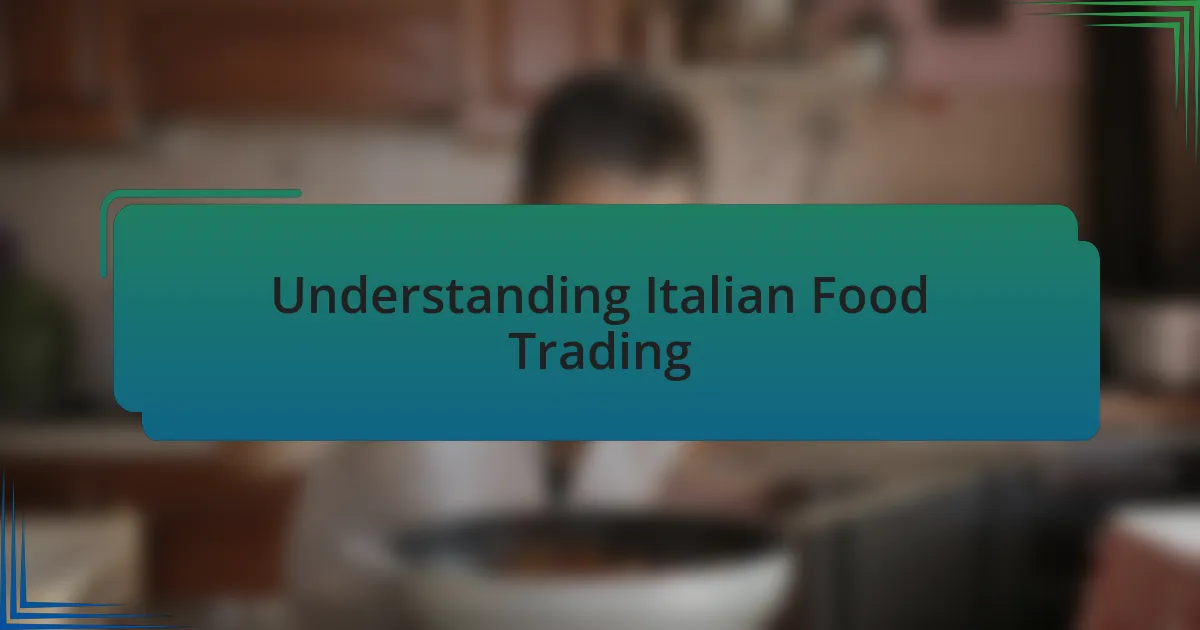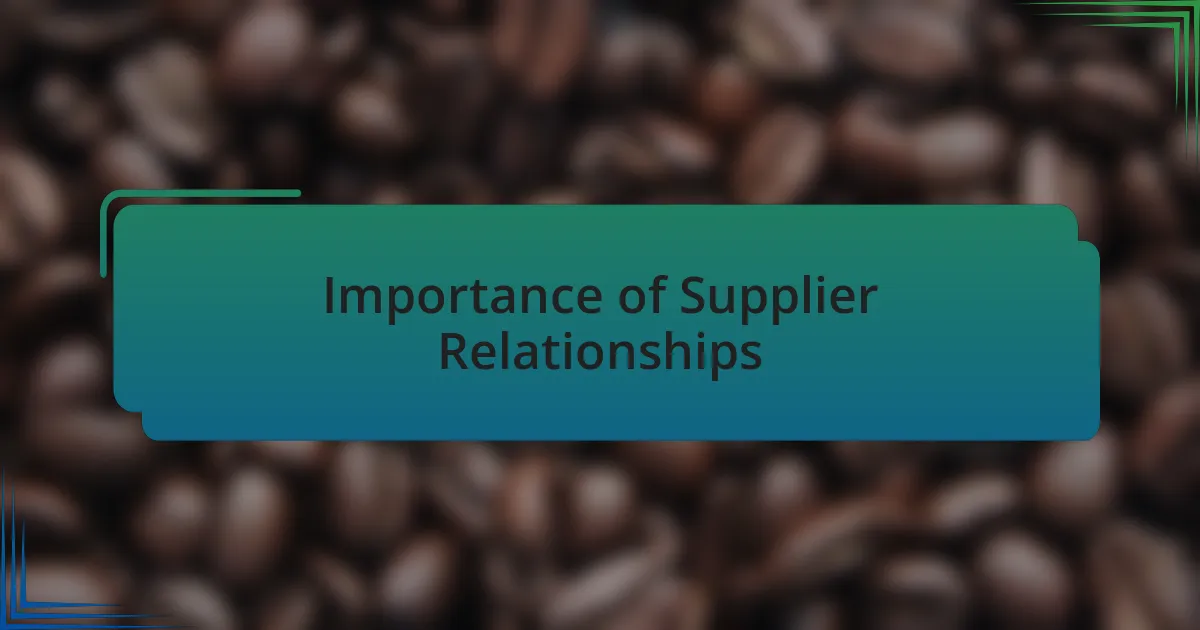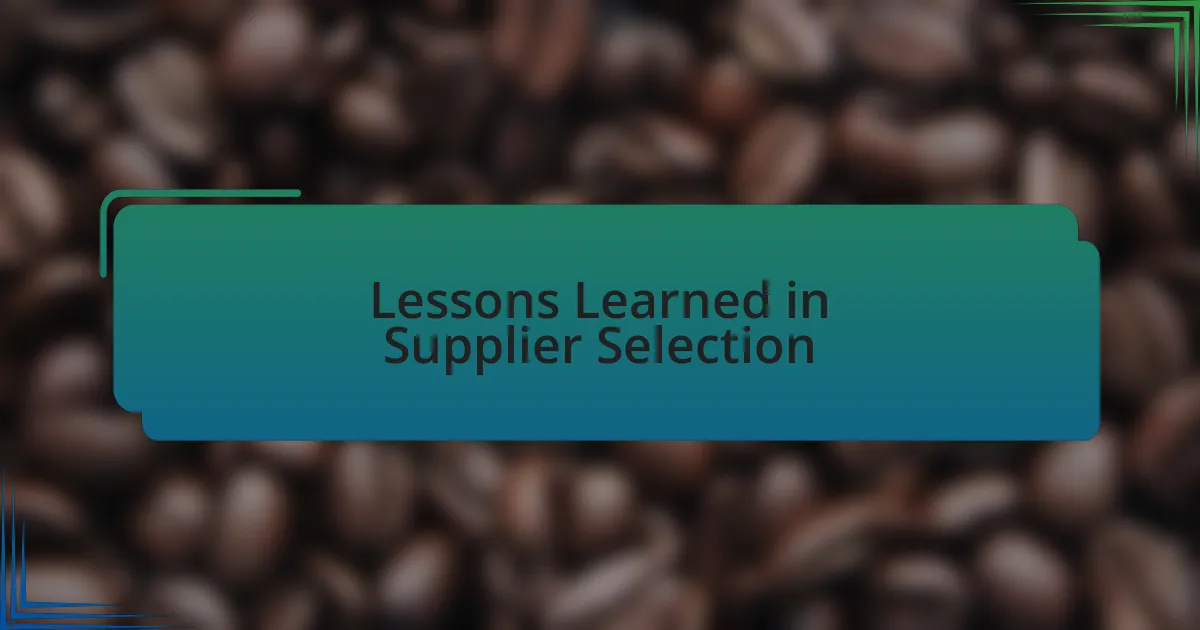Key takeaways:
- Building strong supplier relationships is essential in Italian food trading, enhancing both trust and quality of products.
- Effective communication with suppliers fosters collaboration and ensures a shared vision for quality and sustainability.
- Researching suppliers through personal connections and experiences reveals the stories and passions that enrich culinary choices.
- Sampling products and asking the right questions during evaluations are vital for ensuring alignment with culinary standards and traditions.

Understanding Italian Food Trading
Italian food trading is a fascinating blend of tradition and modern enterprise. I remember the first time I stood in a bustling Italian marketplace, surrounded by the vibrant colors of fresh produce, aromatic cheeses, and cured meats. It struck me how deeply food is woven into the cultural fabric of Italy, and this was my first insight into why sourcing Italian ingredients isn’t just about the product—it’s about connecting with the heritage and passion behind them.
As I explored various suppliers, I began to understand the nuances of Italian food trading. Each region in Italy boasts its unique specialties, from the aromatic truffles of Umbria to the rich olive oils of Tuscany. This diversity made me ponder: how does one ensure authenticity while navigating the complex landscape of suppliers? I’ve learned that building relationships with local producers is key; it’s not merely a transaction but an exchange of stories, culture, and quality that enriches the culinary experience.
Moreover, the emotional connection to Italian food is palpable. There’s a sense of pride that suppliers take in their craft, whether it’s a small family-run vineyard or a centuries-old cheese-making facility. Reflecting on this, I often ask myself how my choices impact these proud artisans. That question leads me to seek out suppliers who share my values, understanding that my decisions in food trading contribute to a larger narrative of sustainability and respect for tradition.

Importance of Supplier Relationships
Fostering strong supplier relationships has profoundly influenced my experience in Italian food trading. I vividly recall a tiny mozzarella producer I visited in Naples; as we chatted about his craft, it became clear that the quality of his product stemmed not just from techniques, but from the pride he took in his work. This personal connection transformed the way I viewed the ingredients I later sourced from him—each ball of cheese became a story, a slice of his passion delivered to my customers.
Over time, I’ve realized that effective communication is the backbone of these relationships. It’s not just about placing orders; it’s about sharing feedback, discussing market trends, and even brainstorming new product ideas together. I’ve often found that when suppliers feel valued and heard, they go above and beyond—whether it’s securing the best seasonal products or offering exclusive deals. These little extras have often turned into game-changers for my business.
Sometimes I reflect on what happens when these relationships falter—when pricing or logistical issues lead to misunderstandings. It’s a reminder that investing time and effort into these connections pays off when challenges arise. Supplier relationships that are built on trust can navigate storms better than transactional ones, ultimately shaping the success of any Italian food trading venture. How would you feel relying on a supplier only when you needed something? I believe that relying on established relationships makes all the difference, not just for the business but for the joy of sharing remarkable food.

Researching Potential Suppliers
Researching potential suppliers is where the journey truly begins. I remember spending hours online, diving into trade directories and food expos, trying to feel the pulse of the Italian food scene. It wasn’t just a matter of finding names; I sought authentic connections, led by the stories behind each potential supplier. Was their passion evident in their online presence? That curiosity drove me to reach out, sparking conversations that revealed much more than just product offerings.
While poring through supplier reviews, I often found myself reflecting on the nuances of what makes a supplier truly stand out. Beyond quality and pricing, I looked for suppliers who shared my vision for excellence and sustainability. I once came across a pasta supplier who not only produced high-quality noodles but also engaged in community-supported agriculture—what a refreshing perspective! Discovering such values resonated deeply with me and reinforced my belief that shared ethics can elevate a business relationship beyond mere transactions.
An essential part of my research involved visiting suppliers in person, sharing a meal whenever possible. There’s something magical about breaking bread together; it offers insights that mere emails could never convey. I recall sharing a risotto with a rice producer in the Po Valley, where our conversation turned to the secrets of aging rice for optimal texture. It felt less like a meeting and more like a collaboration infused with passion and tradition. How often can you find that kind of depth in emails or spreadsheets? Engaging directly can illuminate qualities in potential suppliers that I hadn’t anticipated but ultimately helped to shape my selection process.

Evaluating Supplier Quality
Evaluating the quality of a supplier goes beyond just assessing their product samples. I learned early on that the ethos of a supplier can significantly impact the ingredients they provide. During one evaluation, I received a batch of tomatoes that were vibrant and flavorful, but when I visited the farm, I noticed the care taken in their cultivation. Witnessing the farmer’s attentive methods firsthand reassured me that these tomatoes were more than just produce; they were a product of genuine passion and dedication. It’s moments like these that define a supplier’s quality, wouldn’t you agree?
Another crucial factor in my evaluation process was the supplier’s compliance with industry standards. I remember meeting with a cheese producer who proudly displayed their various certifications, each representing their adherence to quality control and ethical practices. It struck me then that these credentials weren’t just pieces of paper; they were proof of commitment to excellence. Would I risk my reputation with subpar suppliers? Absolutely not. The bottom line is that a trustworthy supplier stands by their practices and is transparent about their processes.
I also emphasized the importance of communication in my evaluations. I once partnered with a distributor who responded to my inquiries promptly and thoroughly, which made all the difference. When challenges arose, such as a shipment delay, their proactive communication kept me informed and reassured. After all, how can you ensure quality if you can’t rely on your supplier to keep you in the loop? Establishing a rapport where clarity and responsiveness are prioritized is integral to identifying the right collaborator in the complex world of Italian food trading.

Building Strong Supplier Connections
Building strong connections with suppliers is essential in the world of Italian food trading. I vividly remember attending a regional food fair, where I struck up a conversation with a small pasta manufacturer. As we talked about our shared love for traditional methods, I felt an immediate bond forming. It was in that moment I realized that genuine relationships often stem from shared values and passions. Have you ever had an encounter where you just knew you found the right partner?
Trust is another cornerstone of these connections. I once worked closely with an olive oil supplier who not only provided exceptional products but also opened their production process for me to see. This transparency was refreshing and had a profound impact on my trust in them. I found that knowing the story behind each bottle made the partnership even more meaningful. Isn’t it amazing how trust can transform a simple business transaction into a collaborative journey?
Consistency plays a major role too. In my experience, regular check-ins have helped solidify my relationship with suppliers. By keeping communication flowing, I’ve been able to navigate challenges together with them rather than against them. One time, when we faced a shortage of a vital ingredient, our ongoing dialogue allowed us to rethink our supply strategy collaboratively. It’s these constant interactions that forge not just a supplier relationship but a partnership grounded in shared success.

My Personal Discovery Journey
Finding the right supplier was a journey filled with twists and turns. I remember a quiet afternoon in my kitchen, experimenting with a new ricotta cheese recipe. The texture just wasn’t right, and that’s when it hit me: I needed to connect with artisan producers. Have you ever felt that urge to go back to the roots of your culinary creativity? It was in these moments of frustration that I began to seek out suppliers who truly understood the craft.
Through several visits to local farms, I met a cheese maker whose passion was palpable. I listened as he spoke about the grazing practices of his sheep and how the flavors developed with the seasons. I felt a genuine thrill; it was as if I had stumbled upon a hidden treasure. How often do we stop to appreciate not just the product, but the story behind it? This experience deepened my appreciation for Italian culinary traditions and led me to value suppliers who nurture their products with care.
One vibrant market day stands out vividly in my mind. I was fortunate to engage with a tomato farmer renowned for his vibrant produce. As we discussed his dedication to organic farming methods, I could see the pride in his eyes. That moment solidified my belief that the best suppliers embody passion and integrity. Have you ever met someone whose enthusiasm was so contagious that it inspired you to elevate your own standards? This discovery journey has not just changed my sourcing, but has redefined the very essence of the dishes I create.

Lessons Learned in Supplier Selection
When it comes to supplier selection, one of the key lessons I learned is the importance of building relationships. I remember my first meeting with a pasta manufacturer—it was during a casual lunch at a small trattoria. As we shared stories over a plate of handmade orecchiette, I realized that genuine connections go beyond business transactions. Have you ever noticed how a personal touch can transform a partnership into something truly special? It was in that moment I understood that trust and rapport are just as important as quality.
Additionally, I discovered that asking the right questions is vital. During a visit to an olive oil producer, I was captivated by the story behind their extraction process. By inquiring about their methods and sourcing practices, I not only gained insight into their product but also established a foundation of transparency. How often do we challenge our suppliers to go deeper? I found that the more I engaged in meaningful conversations, the clearer my expectations became—not just for me, but for the quality of the ingredients in my kitchen.
Lastly, the significance of sampling can’t be overstated. I recall receiving a batch of dried herbs from a reputable supplier. While I appreciated the quality, I couldn’t shake the feeling that something was missing. It taught me that firsthand experience is invaluable; I now encourage tastings and trials from suppliers to ensure their products align with my culinary vision. Isn’t it fascinating how the senses can guide our decisions? This proactive approach has led me to suppliers who share my passion for authentic Italian flavors, resulting in dishes that resonate with both heart and tradition.